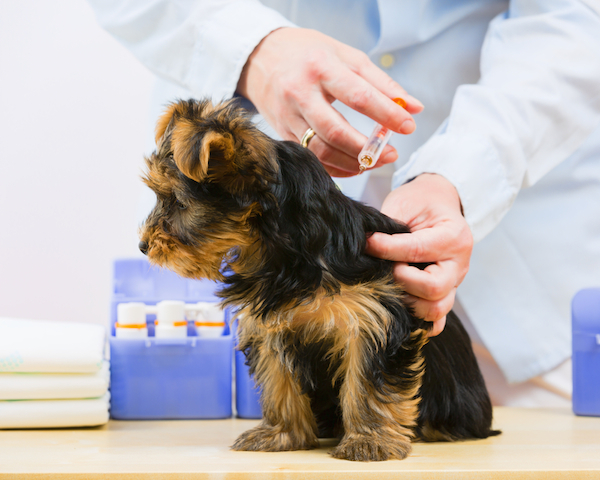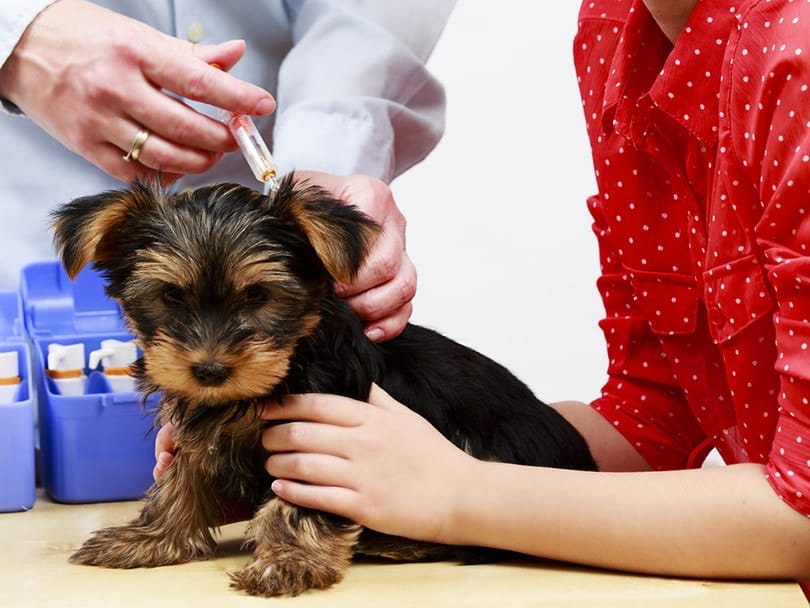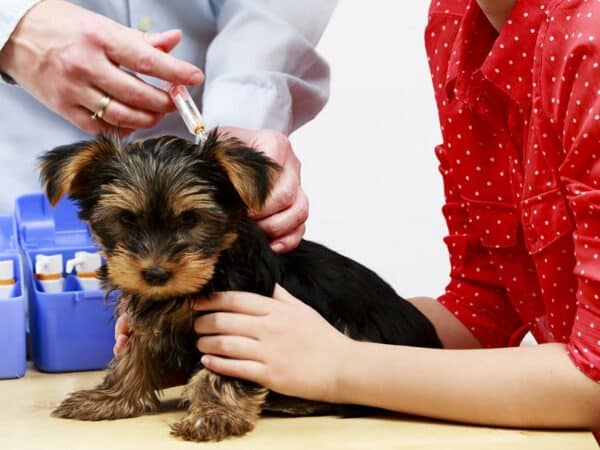Brenda recently left a comment regarding rabies vaccination in puppies:
Dr. Eric,
Please help me with some honest and sensible advice. I took my new Lab puppy to the vet to have her checked out. The girl at the desk put her date of birth in the computer wrong and they inadvertently gave her a rabies vaccine at 6 weeks and 6 days and only 7 pounds. When I talked to a local breeder, she freaked out and told me that could have killed my puppy.
My puppy got very, very sick with vomiting and diarrhea for almost a week, and the vet was concerned about parvo. I paid the $100 vet bill to have her tested, and for an antibiotic for coccidia. My friend says all of that could have been from the vaccine.
My vet says her vaccine was invalid because they vaccinated her too early and I will have to have another vaccine after 16 weeks, which they WILL pay for. However, should I be concerned and at what age should I have the puppy revaccinated? She is the love of my life, and I could not stand to lose her. Was my vet incorrect when they said that vaccinating her at 6 weeks wouldn’t harm her? And could that really be why she was so ill and lost a couple of pounds just a couple of days after the vaccine?

Rabies vaccines are given by law on or after 16 weeks of age in most municipalities. There is nothing magical about the age, other than being the age the government has decreed as acceptable.
Some experts have questioned the current legally mandated timing of rabies vaccination. They point to evidence that pets younger than 16 weeks can contract rabies. A few years ago, a puppy in Alaska I believe was seven weeks old exposed several people to rabies. The 16-week number is not based on any hard science that I am aware of. It’s the government — don’t expect it to make sense.
There is, however, a scientific rationale behind the timing of vaccines in general. A puppy born to a fully vaccinated mother will obtain antibodies to diseases when it nurses during its first day or two of life. They are present in a special type of milk called colostrum, and assist with immunity during infancy. The maternal antibodies thus obtained remain in the puppy’s bloodstream for around 8 to 10 weeks, but sometimes significantly less or more.
Vaccines given when puppies have high blood levels of maternal antibodies will not be effective because the antibodies will inactivate them. Therefore, vaccines are usually timed every 3 to 4 weeks, beginning at 6 to 8 week, with the goal of ultimately administering them when maternal antibody levels have dropped low enough to allow the vaccine to be effective, but not low enough to leave the puppy vulnerable to disease. Multiple vaccines timed this way help to hit this window of opportunity. The precise timing of the window varies from individual to individual.
Brenda, one of two things happened with the vaccine that was administered at 7 weeks. It either was inactivated by maternal antibodies (which is most likely, and which would render it useless but not likely to cause harm) or, if your puppy’s maternal antibodies were low, it stimulated the immune system. This can cause diarrhea and other symptoms, but is also what leads to immunity against rabies.
So it is possible that the vaccine was linked to your puppy’s illness, but it is not a foregone conclusion. Coccidia are common parasites that can cause symptoms exactly like your dog experienced. The symptoms may have been merely a coincidence. The human brain is hard-wired to disbelieve in coincidences, but they occur nonetheless.
In the long run, it is unlikely that the early (and consequently extra) rabies vaccine will cause lasting harm to your dog. That doesn’t mean I’m happy this episode occurred. Clerical errors of the type you describe are common, but vets are supposed to examine their patients before vaccinating them. It’s part of our job to confirm that a vaccine is appropriate for the patient before it is administered.
That said, I also cannot totally condemn your vet, since I wasn’t there and I don’t know how this happened. All people make mistakes. I am sorry that you and your puppy have been involved in this one.
Got a question about dogs? Ask Dr. Barchas in the comments.
Featured Image Credit: gorillaimages, Shutterstock










